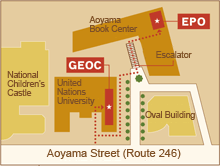Overview
Many of us experienced the non-sustainable society structure after the Great East Japan Earthquake when all infrastructures came to a grinding halt. In light of our experience as a successful renewable energy source during an energy crisis, we have been looking into the steady energy requirements and how to prepare for an unforeseen event. We have reexamined the function of local energy systems from a risk-averse point of view and organized a networking event for stakeholders to enrich the debate and put together a Tohoku proposal.
In 2011 we held a networking event but only got as far as exchanging information. In 2012 we changed the event structure and by the end of the second event were able to organize the information and deepen the discussion. In the first instance we reorganized the information brought forward on successful energy sources in the aftermath of the earthquake and examined the reason for those unsuccessful energy sources. Moving forward, we will share the questionnaire results from each EPO(Environmental Partnership Office) and further discuss the necessary measures required for disaster preparation as well as the future of renewable energy and the role of local energy.
Points about the partnership
– After the Great East Japan Earthquake the interest in renewable energy among local communities in Tohoku are on the rise. This is a project born from the experience of the earthquake.
– The aim is to build an inter-prefectural network by bringing organizations from varying energy sectors together to deepen the discussion.
– The time is ripe, both from a social and historical point of view, for reexamining Japan’s energy system from its foundation. EPO Tohoku(Tohoku Environmental Partnership Office) will take on the role of bringing grassroots discussions into the proposal.
Category
■Project cooperation/project accord
Theme
■Prevention of climate change/energy-related
Actor
EPO Tohoku(Tohoku Environmental Partnership Office)
Partners
NPOs, local governments, local companies, consumers’ cooperative society, energy companies

















